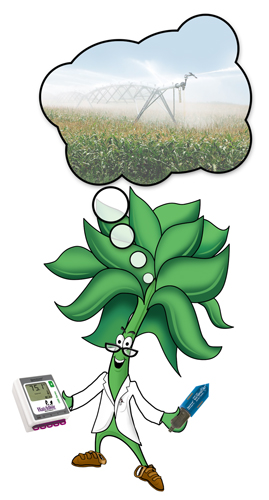Efficient Irrigation
July 7, 2014 12:30 PM

Efficient Irrigation
Worldwide water consumption has nearly doubled in the past 50 years to the point where approximately 2.8 billion people live in water-scarce areas. By 2030, it is expected that nearly half of the world’s population will live in water-stressed areas. Urban and energy uses will have a heavy impact on water available to agriculture, which is estimated to be approximately 70%-80% of the global fresh water use. Currently, about 60% of the world’s food production is generated through rain-fed or natural means, while the remaining 40% is produced on only 20% of the total acres utilizing irrigation as its primary water source. As pressure continues to grow on yield per acre production, so too will the increased need for water.
Efficient irrigation, which plays such a key role in production and profitability for many producers, has become a very  important concern as water shortages increase and impact crop production. Producing more with less has become a way of life for growers who try to make gains in efficiency while conserving their most valuable resource...water. Suitable crop and hybrid selection, proper irrigation scheduling, effective irrigation techniques, and improved water usage information and technology are all management practices that will have to be implemented as part of the producer’s production plans.
important concern as water shortages increase and impact crop production. Producing more with less has become a way of life for growers who try to make gains in efficiency while conserving their most valuable resource...water. Suitable crop and hybrid selection, proper irrigation scheduling, effective irrigation techniques, and improved water usage information and technology are all management practices that will have to be implemented as part of the producer’s production plans.
No matter what type of irrigation a producer employs, it is imperative that they maximize the efficiency and effectiveness of their system. Irrigation scheduling and soil moisture information are two key features in a quality program. While most producers have a process for irrigating their crops, many are still basing their watering decisions on visual inspection...if plants are wilting, there is a need for water. They also may be over-watering, which may result in leaching nutrients out of the soil, or worse yet, starving the plants for oxygen or predisposing conditions for increased plant and soil pathogens. Either scenario will stress the plants and ultimately reduce yields.
The good news is that there are very valuable solutions to monitoring soil moisture which will allow for the optimization of the key ingredients to maximize plant health and yield, while minimizing cost. Current technology such as data loggers and soil moisture sensors, both portable and fixed, are a very cost effective means for producers to monitor soil moisture, minimize water usage, and maximize efficiency as it relates to irrigation. Some solutions also provide the means for the producer to capture data wirelessly and make instant decisions based on real-time information, no matter how far they are from their fields.
Moving forward, an ever growing emphasis will be placed on water conservation and the balance between human and environmental usage. While growers continue to utilize irrigation to increase yields and feed an ever-growing population, there will be an increased effort to develop irrigation systems that are efficient and responsive to growers needs.
All the best,

Related Links:
FieldScout TDR 300 Soil Moisture Meter
WatchDog Irrigation Stations
WaterScout SM 100 Soil Moisture Sensor
WaterScout SMEC Soil Moisture/Temperature/EC Sensor
Back